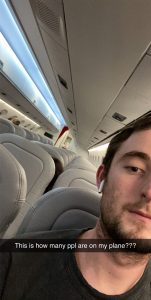Early in the pandemic, Vanderbilt University Special Collections began to collect the University’s response to COVID-19. We knew that we had little in our collections relating to the 1918 Influenza pandemic, and knew that this was our opportunity to learn from that experience. Protocols were established to regularly archive university web pages about the pandemic and our colleagues in Vanderbilt Communications helped us gather examples of posters, swag and other ephemera designed to support pandemic communications. But gathering the response from faculty, students and staff took more of a grassroots approach, utilizing social media and web communications to get the word out about the community effort.
Chris Ryland, curator of History of Medicine Collections and Archives, explained the importance of this new initiative in this video. “This is an unprecedented medical, social and economic event for the vast majority of people living today, and it’s important for us to collect as much as we can about how it affected those working, studying and teaching at Vanderbilt,” said Ryland. “Future historians will use this archive to understand what it meant to live through this unique period of time.”
In this video, Zach Johnson, curator of Special Collections, encouraged the campus community to join in efforts to archive COVID-19 pandemic experiences, including recent vaccine experiences. “It’s easy to think about history as historians looking at the facts from an era and telling us what happened,” said Johnson. “But without individuals taking time to share their personal experiences, it is difficult to reconstruct a multi-dimensional account of what happened.”
 As part of a short series, the Heard Libraries highlighted unique experiences from Vanderbilt students, faculty and staff through the lens of donations to the Vanderbilt COVID-19 Archive.
As part of a short series, the Heard Libraries highlighted unique experiences from Vanderbilt students, faculty and staff through the lens of donations to the Vanderbilt COVID-19 Archive.
For student Jakob Pearson, pictured here on Feb. 27 flying out of Florence, Italy, for a weekend trip, the awareness of a shift in thinking about COVID-19 was acute. In late February, everyone on campus was eagerly awaiting spring break, looking for a brief respite from classes or work before returning to campus to finish the semester. VU Study Abroad students in Florence, Italy, were no different, except they were distantly aware of the warning signs in Italy but were hoping things wouldn’t get worse.
Within two days Jakob’s study abroad program was cancelled, and he was headed back to the United States – not back to Florence to get his things – but home – straight home. To complicate matters further, one of his close contacts on the trip was one of the first confirmed cases in the U.S., and upon Jakob’s arrival, he was informed that he was to begin a 14-day quarantine in a nearby hotel, before heading home.
Submissions like Jakob’s will provide rich research for future scholarship.